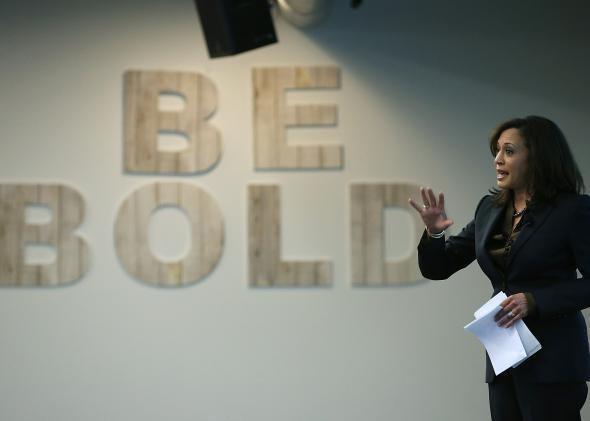Last Wednesday, California Attorney General Kamala Harris asked Sacramento County Superior Court Judge Raymond Cadei to dismiss a ballot initiative that advocates the wholesale murder of gays. As the state’s head legal adviser, Harris is faced with the unenviable responsibility of issuing a name and summary of the initiative by the June 25 deadline. Unsurprisingly, she wants out.
Back in February, Orange County–based attorney Matthew McLaughlin filed the Sodomite Suppression Act with Harris’ office. McLaughlin’s initiative proclaims, “the People of California wisely command, in the fear of God, that any person who willingly touches another person of the same gender for purposes of sexual gratification be put to death by bullets to the head or by any other convenient method.”
McLaughlin hasn’t responded to any press inquires, nor has he tried to defend his initiative in court. Little is known about the attorney, except that his license is still active and that in 2004 he introduced a failed ballot initiative to require the Bible to be taught in public schools.
As Slate’s Mark Joseph Stern reported in March, “Under [California] law, any citizen who properly submits an initiative (and pays the $200 fee) is entitled to gather signatures for their pet proposal.”
McLaughlin’s vile initiative isn’t likely to get onto the 2016 ballot. To do so, it would need to get 365,880 signatures. And it certainly won’t become law, because it’s clearly unconstitutional. But it could, and should, spark a discussion about the abuse of California’s proposition system.
According to KCET, 26 other states have procedures to place popular measures on the ballot. However, California employs the process more than all but one other state, Oregon. Between 1904 and 2010, there have been 340 electorate-generated measures on California ballots. As KQED reports, California’s “threshold for signatures and voter approval is comparatively low,” relative to other states.’ And with California’s population now more than 38 million, these initiatives have the ability to affect a significant proportion of Americans.
Established in 1911, California’s proposition and initiative system came directly out of the Progressive movement’s attempts to curb corruption in state politics. It promised to give the governed close to equal power with elected officials over the state’s legislation—a radical idea and as close to direct democracy as we have in the United States.
But when a hideous initiative such as this one appears, it raises the question: Shouldn’t the system be reformed? And can that be done without destroying this model of direct democracy?
After McLaughlin’s offensive initiative was introduced, some California lawmakers immediately began pushing for reform. As the Guardian reported:
Two Democratic assembly members—Evan Low and Richard Bloom—have introduced an amendment to a bill, AB 1100, that would increase the filing fee on initiatives from $200 to $8,000. A fellow Democratic assembly member, Anthony Rendon, is also planning a bill that would make signatures gathered on initiative petitions matters of public record.
Unfortunately, the first suggested reform runs counter to the intended purpose of grassroots democracy—by significantly increasing the filing fee, it makes it more difficult for individuals or groups with a modest budget to introduce worthy initiatives, potentially decreasing participation in the democratic process. And the second option would do nothing to prevent offensive measures from being introduced in the first place.
The most appealing choice is to give the attorney general the power to weed out offensive and unconstitutional initiatives. Harris’ petition to Judge Cadei is a step in the right direction. Getting the judicial branch involved at an early stage respects the fundamental principle of the initiative system, but it should prevent patently unconstitutional initiatives from getting to the signature stage.
As the ACLU’s Natasha Minsker points out, precertification reviews are already used in eight other states and Washington, D.C. “These jurisdictions,” she writes, “have concluded that some constitutional rights are so fundamental, so core to our democracy, that they simply should not be subject to popular vote, at least not based on the petition-gathering process alone.” Having a review system seems entirely reasonable—it would give courts the ability to limit what would unquestionably be rejected later and spares the targeted group the pain caused by hate-based proposals.
The “kill the gays” initiative will be stopped at some point, either by the judge or by the disgust of the electorate. If a review process were adopted, Californians would send the message that they will not even consider measures that seek to deny others their basic human rights.
